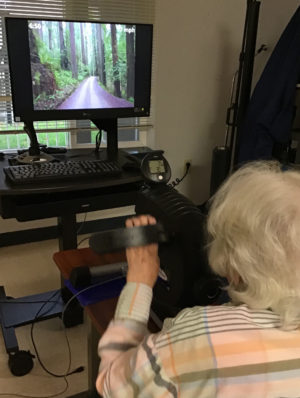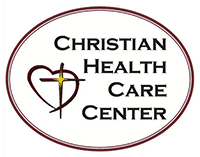There’s a magic room at Christian Health Care Center.
Residents might enter through an unassuming hallway door at CHCC, but inside they are transported to the great outdoors. Inside, they are on a bike ride through the trees, pedaling with glee.
It’s part of a new program at CHCC, through a partnership with iN2L, that brings electronic devices — including bicycle pedals that take residents on virtual trail rides and a driving simulator that transports residents 50 years into the past — to the therapeutic recreation program.
“We are really excited about it,” says Olivia Olson, therapeutic recreation case manager at CHCC. “We are excited to see how technology can give us more options for creativity, one-on-one activities and much more.”
In addition to the driving simulator and stationary bicycles, the program includes a flight simulator and electronic tablets that offer numerous activities for residents, including sing-alongs, trivia games and other one-on-one and group activities.
“It has been a really good tool for use during downtime,” Olson says, “between meals, activities and therapy, or any time a resident has some spare time for fun.”

The tablets come with various apps that can help residents relive past experiences and help them reminisce.
“The app can transport a resident who is a retired farmer back in time,” Olson says. “The farming app can simulate farm sounds, driving a tractor and other elements of farm life.”
The tablets can be tailored to each individual, so any therapeutic recreation team member can switch to each resident’s profile to offer content specific to that person.
Loved ones can send personal photos and videos, and those are then stored in the resident’s specific account, so they can view their photos and videos whenever they want.
“Family members also can record video messages that can act as a sort of reorientation,” Olson says, “saying things like ‘We love you, we’re thinking about you,’ and offering family updates.”
The program also includes a music component, says Kaitlin Gobeille, CHCC’s t-rec director, that was developed by music therapists. It’s another tool CHCC can use in its robust commitment to music therapy.
“There are sing-alongs that are very effective,” Gobeille says. “Some people who rarely speak sometimes sing along.”
In addition to the games and activities, the program also includes simple apps made for relaxation, including simulated fish tanks and fireplaces.
Among the biggest benefits of this program and other uses of technology at CHCC are how they support CHCC’s goal of reducing psychotropic medications through the use of attentive, person-centered care, engagement in meaningful activities and improving residents’ quality of life.
Read more: Technology provides
‘moments of joy’ in memory care
“Overall, the system takes a holistic approach,” Gobeille says. “That is important for us. These aren’t just diversional activities; they are helpful for therapeutics and other things as well.”
Olson, Gobeille and others at CHCC are currently working on ways to integrate the new system with other departments at CHCC, ensuring that the benefits of the technology are maximized. For example, the CHCC restorative department has been having residents use the bike as part of their exercise routines — using either their legs or arms to turn the pedals, depending on their needs.
“Residents have loved this new option,” Olson says, “because they get a change of scenery instead of just using the pedals in their room.”
The program is a result of a grant from LeadingAge Washington through its iNSPIRE! Project, which partners with iN2L to bring technology to long-term care centers throughout the state, including CHCC.
Read more: Therapeutic recreation:
Adapting to meet any situation
